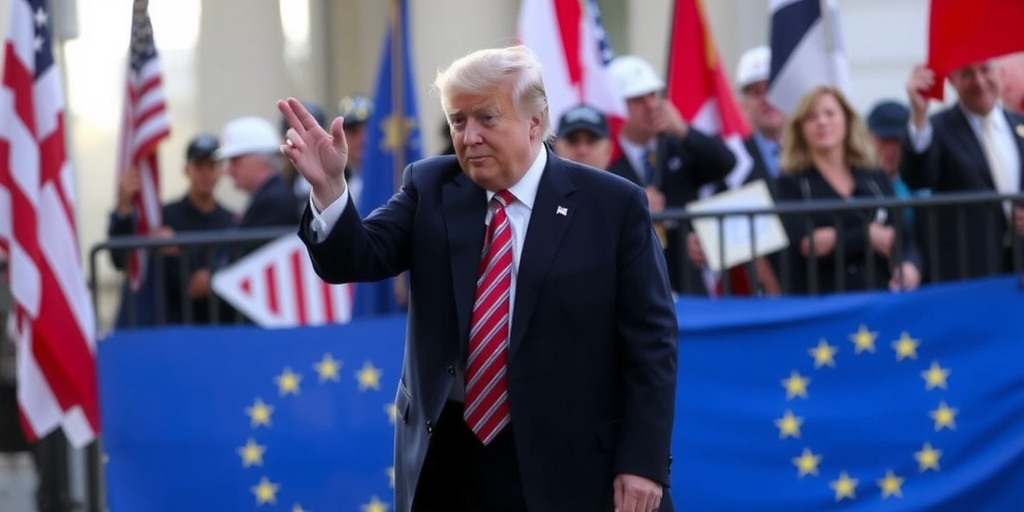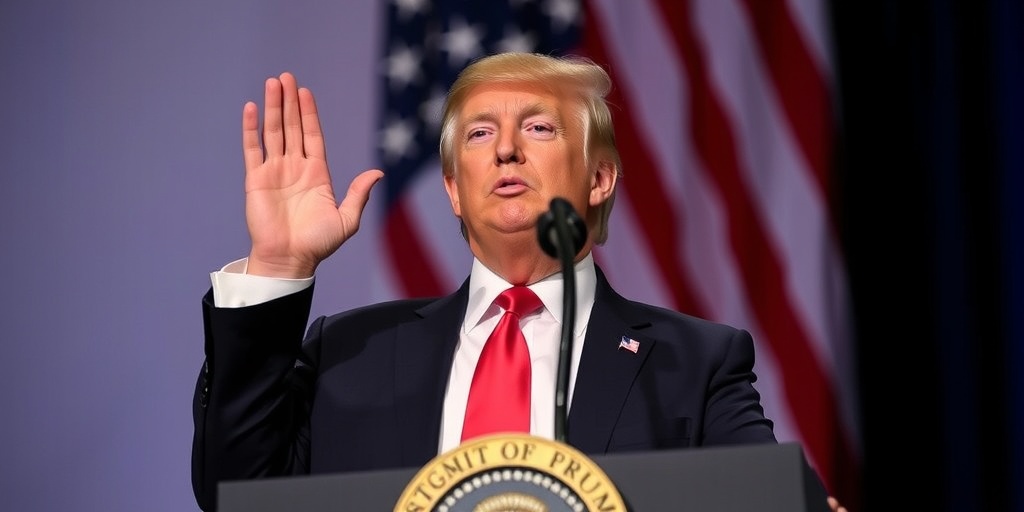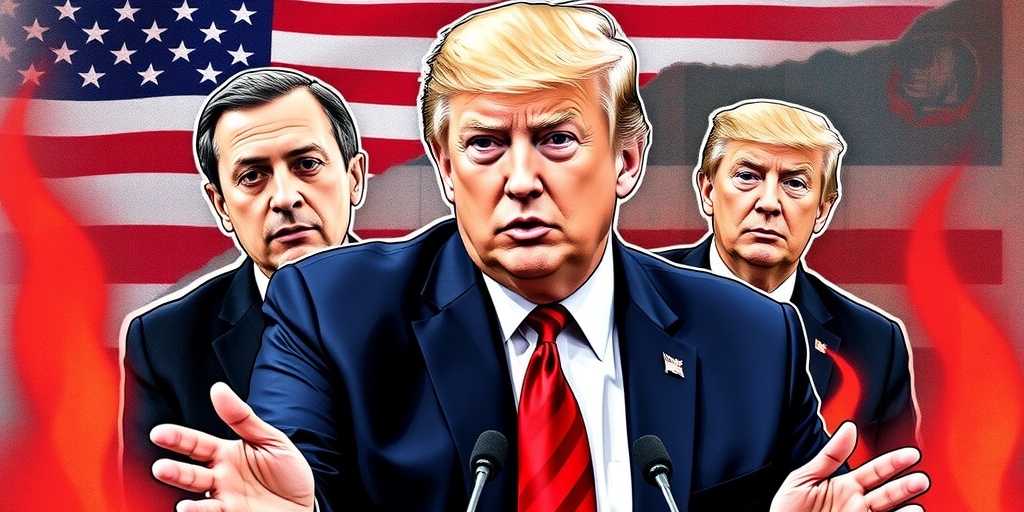Now Reading: Trump Officials Ignore Court Order to Fund Radio Free Europe
-
01
Trump Officials Ignore Court Order to Fund Radio Free Europe
Trump Officials Ignore Court Order to Fund Radio Free Europe

Title: Funding Crisis Forces Radio Free Europe/Radio Liberty to Suspend Operations Amid Trump Administration Delays
The Trump administration has faced significant scrutiny for its handling of funding to Radio Free Europe/Radio Liberty (RFE/RL), a news organization originally established to combat Soviet propaganda during the Cold War. Despite a federal judge’s ruling mandating its continued operation, the administration has failed to release nearly $12 million in congressionally approved funding, leading to furloughs and program cuts at the organization.
RFE/RL, which relies predominantly on government funding for its operations, has found itself in a precarious financial situation, exacerbated by the inaction of the U.S. Agency for Global Media (USAGM), the federal agency responsible for overseeing its funding. The delays in disbursement have forced the organization to lay off staff and scale back its programming, raising concerns about its ability to deliver critical news coverage to audiences in Eastern Europe and Asia.
Benjamin Herman, the general counsel of RFE/RL, expressed urgent concern regarding the funding situation. He stated, “We hope that U.S.A.G.M. sends our April funds immediately. Our journalists across Europe and Asia, who assume enormous risk to work for RFE/RL, rely on the timely disbursement of these congressionally appropriated funds.” The impact of this financial uncertainty is particularly dire for journalists who face significant risks in their reporting, often operating in hostile environments.
Further complicating matters, USAGM canceled satellite contracts for RFE/RL, hindering the transmission of its Russian-language programming. According to internal sources who requested anonymity due to ongoing legal proceedings, this action is poised to disrupt the broadcast reach of RFE/RL, which collaborates with approximately 40 partner stations in Europe. These partners are vital in disseminating the news outlet’s programming, particularly to Russian-speaking audiences.
In March, a federal judge in Washington temporarily halted President Trump’s attempts to terminate RFE/RL, determining that the administration could not unilaterally dissolve a news organization established by Congress. Judge Royce C. Lamberth emphasized in his ruling that the operations of RFE/RL are in the public interest, a sentiment echoed by advocates for press freedom and independent journalism.
However, despite this judicial ruling, RFE/RL’s legal counsel noted that officials from the Trump administration have resisted committing to the disbursement of the funds necessary for its ongoing operations. Marney L. Cheek, representing RFE/RL, stated in court filings that the stalling tactics employed by the Trump administration are detrimental to the organization and its mission.
In response to the ongoing controversy, Kari Lake, a Trump-appointed adviser at USAGM, defended the delays in fund distribution. She claimed that the administration’s goal is to enhance oversight and ensure greater accountability among grantees. Lake suggested that improper use of taxpayer funds had been identified among some of the agency’s grantees, though she did not provide specific evidence to support these claims.
Radio Free Europe/Radio Liberty has a storied history, founded in the 1950s as an intelligence operation financed covertly by the CIA during the Cold War. Although the broadcaster’s initial mission involved fostering anti-communist dissent in Eastern Europe and Russia, it has since transitioned to a Congress-funded entity with editorial independence. Today, RFE/RL delivers news in nearly 30 languages, reaching an audience of 47 million people every week across 23 countries, including key regions like Afghanistan and Hungary.
Stephen Capus, the president of RFE/RL, articulated the organization’s enduring significance, noting, “For more than seven decades, RFE/RL has been a vital U.S. national security asset, fighting censorship to bring news to millions of people in the world’s most repressive societies.” Capus has pledged to persist in legal battles until the Trump administration fulfills its financial obligations to the organization.
While RFE/RL continues to provide a measure of coverage, it is relying on savings accrued from previous funding to sustain operations in the interim. This situation is notably different from that of Voice of America (VOA), which is a federally operated agency where journalists are directly employed by the government. Following an executive order by Trump, VOA staff and contractors were placed on indefinite leave, and efforts to challenge the administration’s order in court are ongoing. Just last week, a federal judge temporarily stopped the Trump administration’s moves aimed at dismantling VOA, though the agency has yet to resume standard operations.
As the legal and funding impasse continues, the future of RFE/RL hangs in the balance, embodying broader concerns about press freedom, accountability in government funding, and the challenges faced by independent media organizations operating in volatile geopolitical climates.
Stay Informed With the Latest & Most Important News
Previous Post
Next Post
-
 01New technology breakthrough has everyone talking right now
01New technology breakthrough has everyone talking right now -
 02Unbelievable life hack everyone needs to try today
02Unbelievable life hack everyone needs to try today -
 03Fascinating discovery found buried deep beneath the ocean
03Fascinating discovery found buried deep beneath the ocean -
 04Man invents genius device that solves everyday problems
04Man invents genius device that solves everyday problems -
 05Shocking discovery that changes what we know forever
05Shocking discovery that changes what we know forever -
 06Internet goes wild over celebrity’s unexpected fashion choice
06Internet goes wild over celebrity’s unexpected fashion choice -
 07Rare animal sighting stuns scientists and wildlife lovers
07Rare animal sighting stuns scientists and wildlife lovers





















